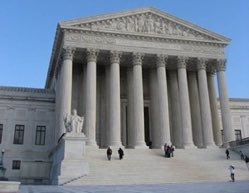SCOTUS Reins in the Power of the EPA
Stacey Lennox : Jun 30, 2022
PJ Media
"Capping carbon dioxide emissions at a level that will force a nationwide transition away from the use of coal to generate electricity may be a sensible 'solution to the crisis of the day' ... But it is not plausible that Congress gave EPA the authority to adopt on its own such a regulatory scheme in Section 111(d). A decision of such magnitude and consequence rests with Congress itself, or an agency acting pursuant to a clear delegation from that representative body..." -Excerpt from Majority Opinion by Chief Justice John Roberts
 [PJMedia.com] On Thursday the Supreme Court handed down a ruling that will significantly curtail the power of executive agencies to control entire sectors of the economy through promulgating rules. (Image: Pixabay)
[PJMedia.com] On Thursday the Supreme Court handed down a ruling that will significantly curtail the power of executive agencies to control entire sectors of the economy through promulgating rules. (Image: Pixabay)
While some commentators view this decision narrowly as a determination of the Environmental Protection Agency's (EPA) ability to promulgate regulations to address climate change, in practice, it sets a precedent that will limit the ability of all executive agencies to make regulations that shift entire industries without specific congressional authority to do so.
The case, West Virginia v. Environmental Protection Agency, originated during the Obama administration. It challenged the EPA's Clean Power Plan, a set of regulations that required all energy producers to transition coal-fired power plants to natural gas. The Obama EPA relied on its powers under the Clean Air Act to make the mandate.
A group of states led by West Virginia and coal industry associations sought a stay on the Clean Power Plan in 2015. The plaintiffs argued the plan exceeded the EPA's mandate under the Clean Air Act and violated states' rights to regulate electrical power. The DC Circuit Court of Appeals denied the plaintiffs a stay in January 2016. When the plaintiffs appealed the issue to the Supreme Court, the justices issued the stay, pending the outcome of all litigation.
This stay on implementing regulations was the first granted by SCOTUS before a review by the federal court of appeals. Many SCOTUS watchers felt this ruling signaled that the court might be interested in rolling back Chevron deference or narrowing the power of executive agencies through the major rules doctrine.
Chevron deference is SCOTUS' legal test to determine when the court should defer to an executive agency's answer or interpretation of the law when authoring regulation. This deference was appropriate when the agency's response was reasonable and Congress had not spoken directly to the precise issue in question. Applying the major rules doctrine would require Congress to speak on substantive issues through legislation before an administrative agency could act. The current court used this reasoning twice during COVID, ending the CDC's eviction moratorium and preventing Biden's vaccine mandate for private employers... Subscribe for free to Breaking Christian News here
Continue reading here.
